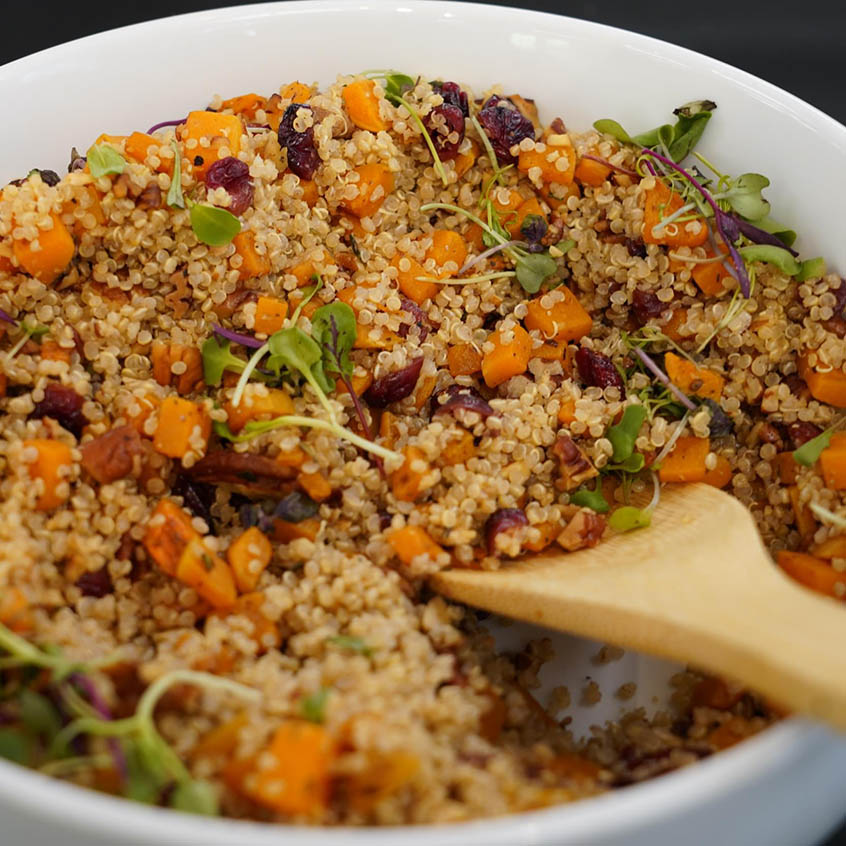
Ayurveda is a 5,000-year-old science of life, rooted in the knowledge and practices of Vedic India. It is designed to help people achieve long life, health and balance. In this one-day workshop led by Chef Richard LaMarita (a student and practitioner of Ayurveda for over 30 years), we will introduce the fundamental principles of Ayurvedic knowledge and practical applications, including diet. You'll learn about the nature and understanding of consciousness; the 5 elements and their relation to the 3 doshas; the definition of health in Ayurveda; how to identify your dosa (body type) and imbalances; the 3 cornerstones of the Ayurvedic diet; the science of digestion (Agni, Ojas and Ama); detoxification procedures; herbal remedies and medicinal uses of spices; and pulse diagnosis. The morning will be spent in lecture; then we'll spend the afternoon in the kitchen with hands-on cooking. We'll make: basil ginger lemonade; aloo chaat (Indian-style potato salad); eggplant mushroom chickpea curry; long beans with paneer; spiced poha (steamed dry flattened rice); and roast cardamom peaches in a ginger syrup.

You will work in teams to execute the class menu. At the end of class, participants gather to enjoy the food they have prepared. Wine is served with meals in most classes. All class menus are subject to change. While a snack platter is offered in both morning and evening classes, you may want to consider a light snack before joining us for class. Students are encouraged to bring a light lunch or dinner to all pastry classes.

You will work in teams to execute the class menu. At the end of class, participants gather to enjoy the food they have prepared. Wine is served with meals in most classes. All class menus are subject to change. While a snack platter is offered in both morning and evening classes, you may want to consider a light snack before joining us for class. Students are encouraged to bring a light lunch or dinner to all pastry classes.
New York City has some of the most famous steakhouses in the country. These classic establishments are known for a distinctive homey atmosphere and a trademark cuisine that has been pleasing diners for decades. Spend an evening learning the techniques and recipes you need to replicate your favorite steakhouse experience at home. You'll make and enjoy classic shrimp cocktail; Caesar salad; grilled New York strip with beurre Maître d'Hôtel; creamed spinach and truffled mashed potatoes.
While handling poultry can seem daunting, it really can be a clucking good time! In Knife Skills 2 you'll discover the fundamental techniques required to transform a whole chicken into popular cuts. We'll cover such topics as trussing and spatchcocking, ensuring you leave with the confidence to tackle any chicken preparation in your home kitchen. No matter how you feel when you enter the class, the class promises to enhance your knowledge of poultry preparation and take your skills to the next level. While not a requirement, it helps to have practiced the skills of Knife Skills 1 before taking this class.
Prosecco, prosciutto and provolone: some of life’s simplest and tastiest pleasures come straight out of Italy. Join ICE Director of Wine Studies Richard Vayda for a delicious discussion, as you tour some of the major wine regions of Italy while tasting traditional cheeses and cured meats. Winemaking, as well as the production of cheeses and salami, will be covered. Throughout it all, you'll enjoy a variety of scrumptious Italian pleasures, from fresh and uncomplicated to rich and complex. Un vero festival! We'll taste at least eight wines, plus matching cheeses.
Before heading out to your local sushi bar for your next date night, come to ICE to learn how to create your own sushi and sake bar at home. Together, you'll start by learning the basics of how to make the foundation of all sushi: delicious, seasoned rice. You'll then create a variety of sushi accoutrements, along with vegetables and raw fish. Finally, you'll learn to make traditional hand rolls, maki, futomaki, and nigiri, before sitting down to eat with a refreshing glass of Japanese sake or a cucumber-sake cooler.
Ranked as America’s Best Culinary School (USAToday 2019), our roster of Chef-Instructors have run top kitchens around the globe.
| (Separate multiple addresses with commas like: john@aol.com, jane@aol.com) | |